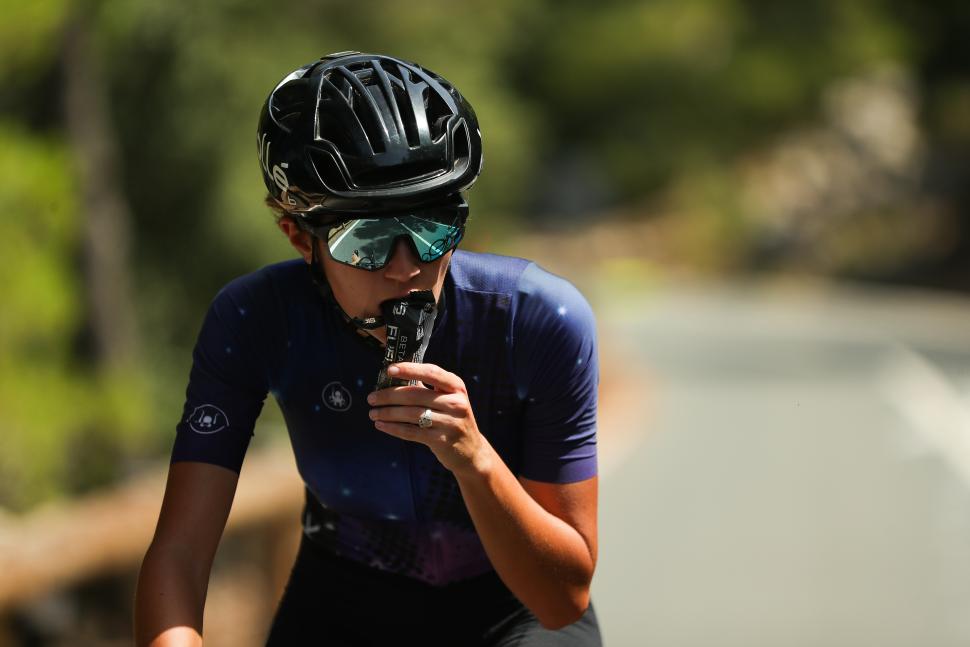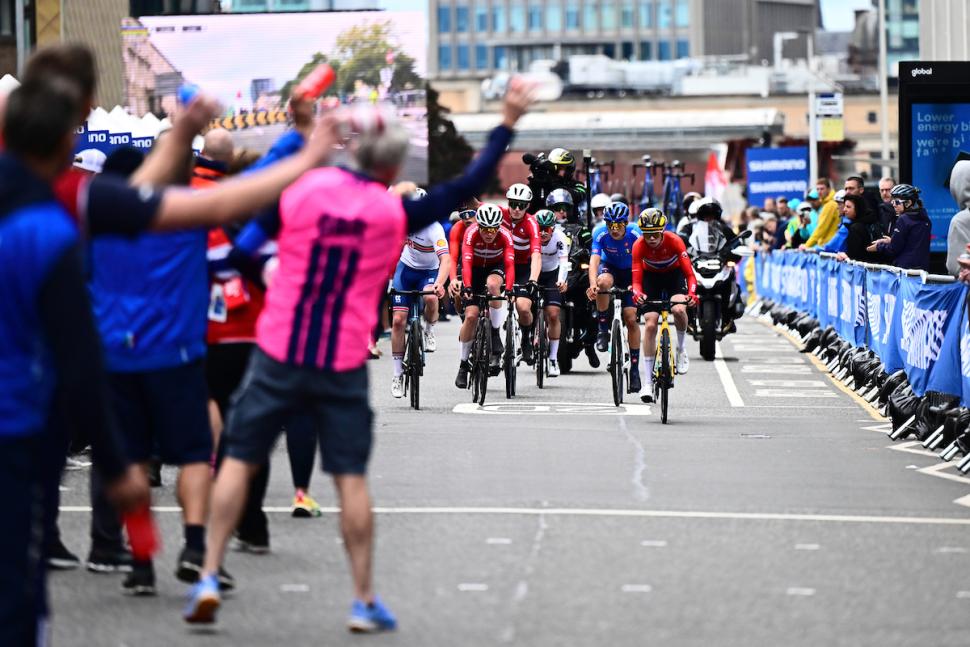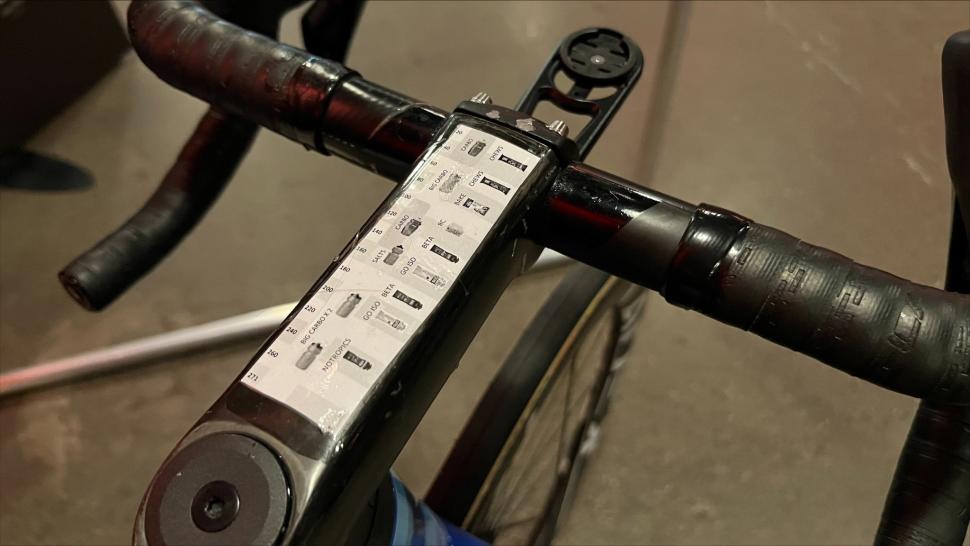- News
- Reviews
- Bikes
- Accessories
- Accessories - misc
- Computer mounts
- Bags
- Bar ends
- Bike bags & cases
- Bottle cages
- Bottles
- Cameras
- Car racks
- Child seats
- Computers
- Glasses
- GPS units
- Helmets
- Lights - front
- Lights - rear
- Lights - sets
- Locks
- Mirrors
- Mudguards
- Racks
- Pumps & CO2 inflators
- Puncture kits
- Reflectives
- Smart watches
- Stands and racks
- Trailers
- Clothing
- Components
- Bar tape & grips
- Bottom brackets
- Brake & gear cables
- Brake & STI levers
- Brake pads & spares
- Brakes
- Cassettes & freewheels
- Chains
- Chainsets & chainrings
- Derailleurs - front
- Derailleurs - rear
- Forks
- Gear levers & shifters
- Groupsets
- Handlebars & extensions
- Headsets
- Hubs
- Inner tubes
- Pedals
- Quick releases & skewers
- Saddles
- Seatposts
- Stems
- Wheels
- Tyres
- Health, fitness and nutrition
- Tools and workshop
- Miscellaneous
- Buyers Guides
- Features
- Forum
- Recommends
- Podcast
news
 2022 SiS beta fuel
2022 SiS beta fuelFasted training doesn't make you faster: Study from researchers including Tadej Pogačar's nutritionist suggests high-carb rides deliver similar results
A study published in the journal Nutrients in Spain has shed new light on fasted training vs high-carb fuelling for cyclists, with the results supporting some long-standing theories about the limited efficacy of fasted training. The paper goes so far as to conclude that fasted training elicits no "superior results" compared to fuelling with plenty of carbohydrates. So should cyclists be indulging in as many carbs as possible before our rides? Perhaps not quite yet...
This newest paper on the subject of fasted training for cyclists is not exactly groundbreaking in its findings. Numerous studies and pro cycling teams, perhaps most notably Team Sky, have explored the impact of different nutrition strategies, including fasted training, where athletes exercise with reduced carbohydrate availability, and high-carbohydrate diets which utilise liberal carb consumption. The results have been always mixed, but not many have concluded that it doesn't matter so much whether you strictly schedule your carb intake, or indulge in pasta liberally.
In this newest study, the researchers from the University of the Basque Country – including Tadej Pogačar's nutritionist Gorka Prieto-Bellver – took seventeen trained male cyclists who were then randomly assigned to two groups. The carbohydrate periodisation (PCHO) group consist of nine cyclists with an average age of 24.8 years and a peak power output (PPO) of 379.1 watts. The high-carbohydrate group (HCHO) included eight cyclists with an average age of 28.2 years and a PPO of 390.6 watts.
All participants were training 15 to 20 hours per week and competing in the U23 national-level cycling categories before the study. After the groups were formed, both the PCHO and HCHO groups then underwent a five-week endurance training program but followed different dietary plans with similar energy intakes. The riders did a few hard workouts every week, with one rest day dotted in, and two gym sessions to complete the load.
The PCHO group completed 13 "low" sessions with reduced carbohydrate availability, based on low-intensity training sessions. These sessions were designed to improve performance and were spread throughout the week. The PCHO group's diet involved altering carbohydrate intake at different times; in other words, they were likely having lower amounts of carbs for low-intensity sessions and more for high-intensity sessions.
> How to eat right for sportives and long rides
In contrast, the high-carb group performed all training sessions with high-carbohydrate availability before, during, and after exercise – a scenario that already sounds much simpler.
The HCHO group's diet included consistently consuming high levels of carbohydrates, such as pasta and rice, to fuel their bodies during exercise.
Which worked better, fasted or carb-fuelled training?
The researchers concluded that there were no substantial differences between the two diet groups in terms of the duration they could exercise before exhaustion, saying: “Periodizing the carbohydrate intake in well-trained cyclists during a five-week intervention did not elicit superior results to an energy intake-matched high-carbohydrate diet in any of the measured outcomes”.
At the end of the five-week test period, both groups showed similar improvements in the maximal lactate steady-state (MLSS) tests, recorded in both watts and W/kg. Both groups also had similar patterns of carbohydrate and fat utilisation during exercise, indicating that the type of diet did not really affect how their bodies used fuel.
All of the participants, regardless of the diet, also showed reductions in body fat and increases in muscle mass.
What's in this for me?
The findings outlined in this study could indicate that the increasing push for consuming lots of carbs on rides is here to stay – but you should probably take its findings with a pinch of salt. The study's lead author, Dr. Garcia-Pallares, emphasised that "athletes can benefit from either diet as long as they carefully manage their calorie intake and align their diet with their training regimen." In other words, fasted rides are unlikely to disappear from pro training regimes, because it's still a method of controlling calorie intake.
> Winter training nutrition — get the best fuel for these 4 common situations
What the research does highlight is the importance of individualised nutrition plans tailored to an athlete's specific needs and goals. What works best for one cyclist may not necessarily be ideal for another.
In other words, while the study seems to imply that the more restrictive carb-periodisation doesn't give you that much advantage, it might work for some. It's also worth noting that this study only had 17 participants, all of whom were male. Similar studies conducted with female athletes in this field are still lacking and the little research has shown women's bodies react to fasted training quite differently to men's.
Suvi joined F-At in 2022, first writing for off-road.cc. She's since joined the tech hub, and contributes to all of the sites covering tech news, features, reviews and women's cycling content. Lover of long-distance cycling, Suvi is easily convinced to join any rides and events that cover over 100km, and ideally, plenty of cake and coffee stops.
Latest Comments
- MatzeLoCal 2 min 4 sec ago
In this case, I would not blame the motorist. At 0:02 of the video it's clear to see that the car is on the opposite side of the lane. When front...
- KDee 15 min 11 sec ago
Article says the rear is hydrolastic...and the front is "flexitor". Whatever the fudge that is. I don't see an exposed hose routed front to back,...
- chrisonabike 28 min 14 sec ago
The Sheffield stand design with a cross-bar (can't recall the name) does at least mean that with two locks in the right place it takes twice as...
- Miller 52 min 17 sec ago
10 speed, QR for disk (!), mech shifting - he needs to look at some more recent bikes.
- David9694 1 hour 25 min ago
Good on him, he might be out of pocket by £100, but he still has a visual pun sense of humour....
- Hirsute 1 hour 52 min ago
A couple say they are fearing for their lives as a huge 4x4 car has been left "dangling" at the top of their back garden for several days. They...
- Paul J 1 hour 58 min ago
Sounds like 3 of these were top product development engineering staff, rather than corporate-BS-waffle execs.
- Paul J 2 hours 4 min ago
By employing a bit too many "brand" and "lifestyle" type people in the west at highish pay?...
- Creakingcrank 2 hours 59 min ago
They certainly work on a seatpost (whether one that thick I'm not sure) - I've used one to carry a saddlebag low down on the seatpost of my road...
- 11waterloo 3 hours 30 min ago
Tip of the hat to a rejuvenated Mountain Renegade! Nice to have you back Tony



Add new comment
13 comments
Can we do this again for fat knackers as opposed to well trained athletes whose numbers are going to be pretty close from start to finish, please?
And can we stop assuming that carbs only come from pasta, embrace the beans!
While I know doing clinical trials is really difficult this trial has very little meaning. The numbers in each group are not great enough leading to a strong likelihood of statistical error. In young U23 there will likely be a lot of different confounding factors that effect their performance. They rightly conclude very little. It's bad science. Slightly better than nothing.
For the majority of people who ride, this is absolutely meaningless.....Juat get out and ride, and enjoy doing it.
And cake.
Especially cake. I'd volunteer to participate in a cake based study...
All participants were randomly assigned to either a carbohydrate periodization (PCHO) group (n = 9) (age = 24.8 ± 8.3 years) ... or a high-carbohydrate group (HCHO) (n = 8) (age = 28.2 ± 4.2 years)".
"All participants were ... competing in the U23 national-level cycling categories before the study"
How long before?
yes, that age explanation with U23 racing doesnt make much sense...
I wondered if perhaps it has been lost in translation, maybe it meant all the riders had raced at least up to national under-23 standard at some point in their careers?
Kinda misses the point for fasted riding for recreational enthusiast riding.
For me at least (subjectively) it reduces the chance of bonking when I inevietably screw up my fueling. I can ride longer and safer in calory deficit after a period fasted training beforehand.
Cant speak for anyone else but either Im a wimp or my bonks are really severe unpleasant experiences to be avoided at all costs and fasting seems to help.
I'm not sure how much can really be extrapolated from this study, given that you're talking about a very small group of elite level riders putting in long hours training every week. They're unlikely to have much in the way of excess fat around anyway.
But personally I agree with you. I had a couple of years of mainly keto diet, with intermittent fasting. Given I like to do my outdoor rides as early as possible (commutes excepted), this meant fasting. I had got to the point where I could do 4-5 hour rides on just water - maybe not very quickly, but I wasn't in a hurry.
I haven't seen anything in this discounting the triggering of fat burning energy paths extending beyond the period of exercise (ignoring trained athletes here), so I'm happy enough to believe that this did help me get to and maintain the lowest weight I had in years. Lockdowns and comfort eating put paid to a chunk of those gains, and I've stepped back from keto for now, but I'm on a drive to get back to that ballpark and intermittent fasting is one of the tools.
What's the point of doing a long ride if you can't stuff your face before, during and after?
QOTW!
'17 participants' isn't truly a 'study'. It's little more than 'post-ride café talk'.